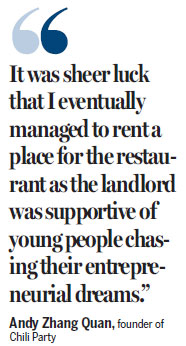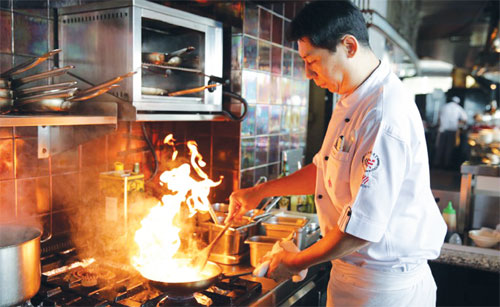Spicing it up
Updated: 2015-08-21 08:54
By Felix Gao in Hong Kong(HK Edition)
|
|||||||

Running two restaurants in Hong Kong is no easy task for anybody, not the least for mainland entrepreneur Andy Zhang Quan.
Zhang, who hails from Zhejiang province, however, feels he's not only on the right track - he's aiming for the sky.
Unlike most of his fellow countrymen, the 26-year-old has a special affinity with hot and spicy Sichuan cuisine. After setting foot on Hong Kong in 2011 to pursue his master's degree, he found his culinary love threatened - tasty Sichuan food is not only expensive but a luxury. He and his friends lamented that Hong Kong food comes at too high a price tag and is unsavory. The only way out is to head north to Shenzhen to hunt for authentic Sichuan flavor.
But Zhang says he enjoys Hong Kong's freedom and its culture that blends East and West. "Hong Kong is a place with more possibilities. You can do many things that you want to pursue." For that reason, Zhang decided to call Hong Kong his home rather than to return to the mainland to attend to his family's real estate business after graduation.
For a start, he landed his first job with a local travel agency in tandem with the Chinese saying "riding the bull while looking for the horse". Starting a business has never been far from his mind.
"I found that as more mainland people come to Hong Kong, they're sorely missing out on the specialty foods of their hometowns. I felt this is a market with the right potential."
Zhang let known his wishes in his microblog that he intended to open up a Sichuan restaurant in Hong Kong. To his surprise, he got 500 "yes" votes.
Inspired by the promising prospects, he decided it was time for action. Zhang's family gave him the impetus with startup capital while friends chipped in with some money, raising a total of HK$2.5 million for the eatery to kick off.
But, even with the available funds, he soon realized that starting a business does not necessarily mean life would be a bed of roses. "Initially, they (the landlords) were reluctant to rent me the place because they were worried about its future prospects. It was sheer luck that I eventually managed to rent a place for the restaurant as the landlord was supportive of young people chasing their entrepreneurial dreams."
Zhang also ran into hitches applying for the license. "It took me more than half a year to secure all the licenses. In the first few months, I had to run the restaurant without a license and had to pay a monthly fine of HK$20,000," recalls Zhang.
Getting a work permit for a mainland chef was another big hurdle to overcome and it would take a long time. Therefore, Zhang chose to hire local chefs instead. The only challenge is to train them.
"I would spend days researching with books on cooking and watching videos on food without eating or sleeping. I ultimately won kudos from friends saying they love my delicious Sichuan food. I taught myself how to cook and then taught all the chefs."
The efforts paid off in November 2011 when Zhang opened his first restaurant, Chili Party. The signature dish is spicy pot, a popular Sichuan food on the mainland rarely served in Hong Kong.
Zhang went the extra mile to promote his eatery - both offline and online. Except for flysheet and roll-up banners, WeChat and microblog played key roles in popularizing the restaurant.
"Every two months, we would launch big promotional activities online, offering special discounts for valued customers. The information is widely spread on the Internet."
Apart from culinary expertise, Zhang had never thought that getting dishwashers would present an enormous headache. "We couldn't find enough dishwashers. So, in the beginning, my partners and I would take turns to wash the dishes for a month."

Staff turnover was another acute problem in the catering industry. Local employees are generally much older than those on the mainland. Zhang says it's difficult for them to accept new ideas, including online operations and the methods of cooking mainland dishes.
Zhang had to change the restaurant manager and attendants within two years.
He once fired the chief chef, forcing the restaurant to close for three days. "Our business was booming at that time. The head chef demanded pay rises. I raised his pay by HK$2,000 for two consecutive months, but he was still unhappy."
Zhang agrees that starting a business is fraught with problems. As a mainland resident, he has gradually learned more about Hong Kong and accumulated the experience of running a business.
As business boomed, with a growing number of both local and mainland customers, Chili Party is turning itself into a sound business venture. Zhang says he's now staring at a monthly profit of between HK$50,000 and HK$100,000.
His second restaurant opened in August last year, specializing in spicy hotpot and crayfish dishes.
Zhang's goal is to bring more mainland cuisines to Hong Kong and set up an online gourmet community to provide more value-added services, including selling food-related products and organizing activities for members.
felix@chinadailyhk.com
|
As more mainland people come to live in Hong Kong, startups are looking into a niche market of catering to those people's needs for mainland-flavor foods in the city. And now, with the help of online social networks, the Internet has become a platform for interacting with the startups' target customers. Asia News Photo |
|
Chili Party founder Andy Zhang Quan explains his methods of promoting spicy hotpot business with "Internet thinking" at a seminar in Hong Kong. Provided to China Daily |
(HK Edition 08/21/2015 page11)

